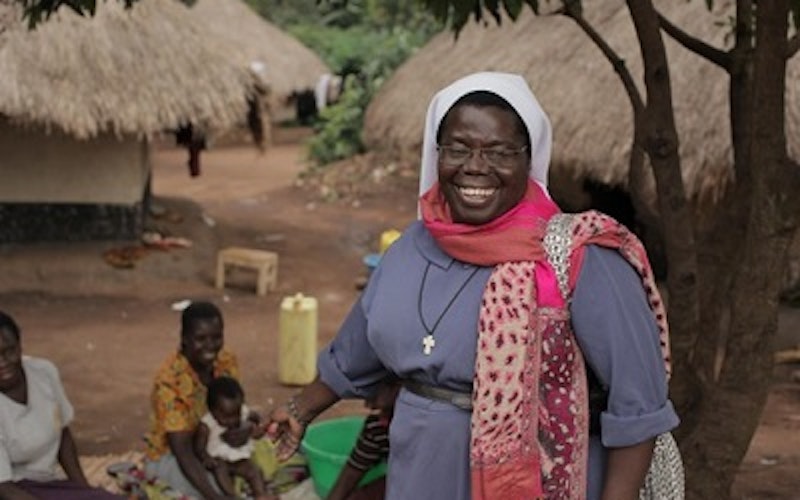
Culture At Large
Sewing hope with Sister Rosemary Nyirumbe
If you’ve not yet heard of Sister Rosemary Nyirumbe and her ambitious, hopeful work at Saint Monica’s Tailoring Center in Gulu, Uganda, now would be a good time to get to know her. While we worry over the well being of West Africa and impotently hashtag into the universe #BringBackOurGirls, we need to know that people like Sister Rosemary live and flourish in the middle of unspeakable human suffering.
I first became acquainted with her story watching Sewing Hope, a documentary chronicling her work among former child soldiers who had been released from the Lord’s Resistance Army back into the Gulu community. Joseph Kony and his army of rebels abducted, raped, maimed and forced children to kill their own families. The LRA then released the child soldiers - now grown - back into the very communities in which they had committed violent crimes. The girls returned to their homes carrying on their backs the children they birthed to Kony’s officers, only to discover they had become outcasts to their own neighbors and family.
Early in the film we see the peaceful setting of Saint Monica’s vocational school. We hear the girls praying together, “Have mercy on us. Forgive us our sins.” I never expected to hear these girls – victims themselves - confessing their own sins. Later the beauty of this prayer becomes clearer as one girl, eyes on the ground, tells the interviewer: “The first prayer I pray at night is an act of contrition asking God to forgive me for what I have done. I find it very difficult to forgive myself. I feel like I need someone else to pray for me. I don’t think I can forgive myself. “
In the next scene, Sister Rosemary sits in the yard with this same girl, recounting the Gospel of a God who loves and forgives at the cross of Christ. “Do you understand?” Sister Rosemary asks as she leans over into the girl’s line of vision. She keeps her face down and mumbles, “Yes.”
We need to know that people like Sister Rosemary live and flourish in the middle of unspeakable human suffering.
Sister Rosemary explains, “A lot of them keep throwing blame back on themselves. I know to forgive is a long journey and I will never tell a girl who has gone through a lot of experience of pain, ‘Forgive. Forgive.’ It must be practical...”
Into this tension Sister Rosemary works miracles with sewing machines and pop tabs, the practical instruments she wields to restore dignity to the wrecked lives of hundreds of Ugandan girls. She teaches them to craft clothing and handbags for sale around the world as a way to recreate a home and life for themselves and their children. She gives them vocational skills to rebuild their lost futures. She gives them love that heals their broken past.
Forgiveness is only powerful if it is offered unconditionally, for both the abused and abuser. I have not been to Uganda, but I’ve heard first-hand the traumatic stories of the abused. At times I’ve heard the confessions of those who were once the abuser. For Sister Rosemary’s girls the practical steps toward forgiveness look like learning a trade; in the stories I’ve heard it looks like learning to share a meal. The abused and the abuser coming together around the body and blood of Christ, fingertips dusty with the broken bread, passing a cup of forgiveness from one mouth to another.
In one of the closing scenes of Sewing Hope we see several women dancing barefoot in the African dust, laughing at themselves and each other. It’s a beautiful moment of buoyant freedom, as they dance on the ground of their suffering. May we echo as a prayer these words from Sister Rosemary: “God, let me see the face of Jesus in anyone who comes to me. Even the bad heart. And let that person see the face of Jesus in me.” Like the women in Uganda made beautiful in forgiveness, let that first face be my own.
Topics: Culture At Large, Theology & The Church, Faith, News & Politics, World, Justice